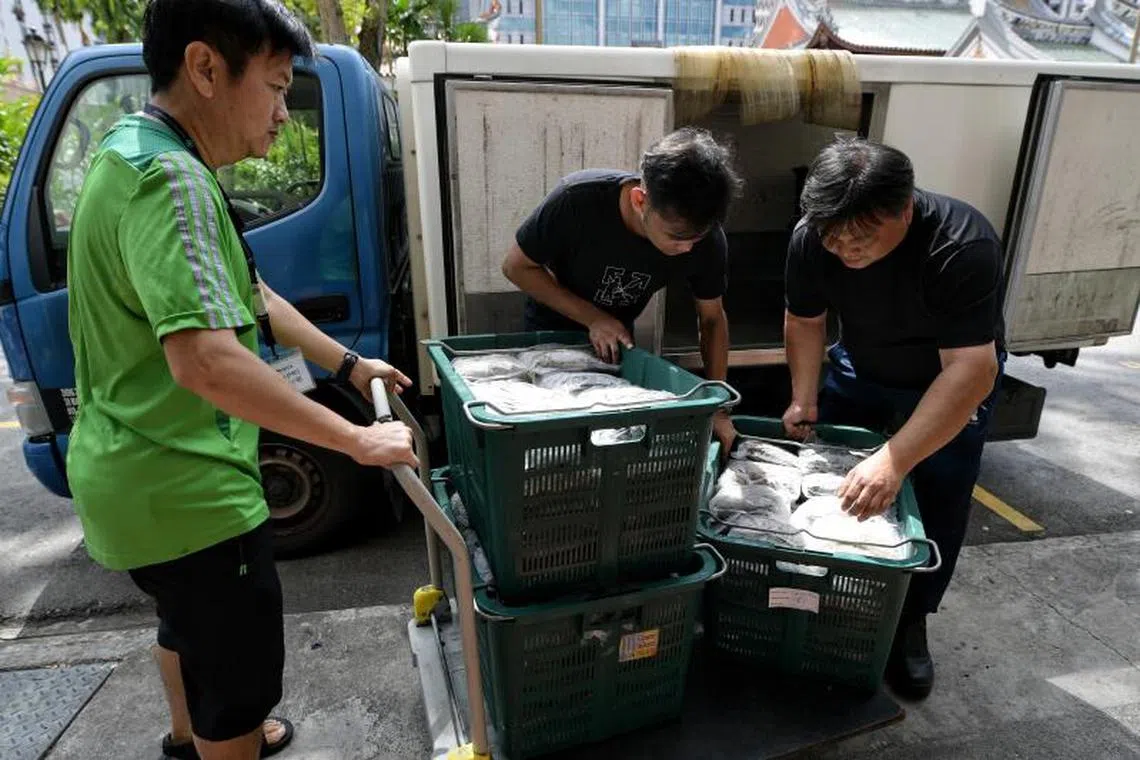Donors use indemnity forms to avoid liability even as Good Samaritan Food Donation Bill is being drafted
Sign up now: Get ST's newsletters delivered to your inbox

The move could encourage more businesses to donate their surplus food to help feed the hungry.
ST PHOTO: NG SOR LUAN
SINGAPORE – While legislation to waive liability for food donations
The first draft of the Good Samaritan Food Donation Bill is now ready and will be introduced as a Private Member’s Bill, MP for Nee Soon GRC Louis Ng said.
While the Bill is similar to laws in other countries like the United States, Italy and Canada, it will also look at setting minimum standards, such as compliance with food safety and hygiene laws and ensuring the food is safe for consumption at the point of donation.
The move could encourage more businesses to donate their surplus food to help feed the hungry. According to latest figures from the National Environment Agency, Singapore generated 817,000 tonnes of food waste in 2021 – a five-year high – while the recycling rate was 19 per cent.
Mr Ng, who mooted the Good Samaritan Food Donation Bill in Parliament in 2020, did not give a specific timeline for when it will be tabled in Parliament, as feedback is still being gathered from stakeholders.
Mr Ng, who is chairman of the Government Parliamentary Committee on Sustainability and the Environment, is working with MPs Poh Li San, Edward Chia and Hany Soh to introduce the Bill.
In the meantime, industry players and most food rescuers of cooked food have been signing indemnity agreements to release donors from potential claims.
Mr Vincent Phang, chief executive of Tung Lok’s events and catering arm, began signing indemnity agreements in 2018, when the company made its first food donation to SG Food Rescue at an event at the Singapore Expo.
Having crafted the indemnity form, Mr Phang, who is also president of the Association of Catering Professionals Singapore, said the form “should indicate that the food rescued exceeds the four-hour timeline governed by an SFA ruling, and caterers will not be responsible for any cause of food poisoning or discomfort”.
The association has 90 caterers and 90 vendors and suppliers as members.
The Singapore Food Agency (SFA), which regulates food safety, said food-borne pathogens exist in cooked food kept at temperatures of between 5 deg C and 60 deg C. No food should be kept at room temperature for more than four hours from the time it is cooked at a caterer’s kitchen to the time it is consumed.
For Food Bank Singapore, its food donor release form came about in 2017 as the SFA does not have rules under the Sale of Food Act for businesses to donate food, said founder Nichol Ng.
Ms Lin Qing Hui, founder of Divert for 2nd Life, which has been signing indemnity agreements with donors of cooked food since it was founded in 2018, said: “Liability is a concern for many businesses, so it was quite natural to come up with a release agreement.”
Mr Daniel Tay, who co-founded SG Food Rescue before stepping down from the group in 2020, said: “Cooked food is the dangerous one because it has the highest chance of being contaminated without people realising it, which is why some food rescue groups don’t even want to try to rescue cooked food, and prefer to rescue other types like fresh produce, raw food and dry goods, where you can see or smell very obviously if it’s gone bad.”
Both Ms Lin and Mr Tay noted that most business donors prefer not to be named to protect their reputation.
While most food rescuers have yet to encounter major food poisoning incidents, Mr Tay said the fear remains for donors from F&B establishments.
He cited one example of a beneficiary blaming a donor for food poisoning, even though others who ate the food were not affected. “Even without evidence, the reputational damage can be detrimental,” he said, adding that the company stopped donating food.
In response to The Sunday Times’ queries on whether complaints were made against food donors, SFA said only that all cases would be investigated.
To maximise food safety, Food Rescue @ Events (FRE) accepts excess food that is stored and delivered in accordance with SFA guidelines, including food that has been stored below 5 deg C or kept warm at above 60 deg C, or buffet food kept at room temperature that has been rolled out for less than four hours.
Having rescued cooked food since 2017, FRE does not issue indemnity forms on a regular basis.
Its founder, Mr Den Teo, said many donors initially raised concerns about whether the food would remain edible after donation, but that concern has waned over the years. “They trust our volunteers to practise good personal hygiene, as many of them have attended the basic food safety course.”


